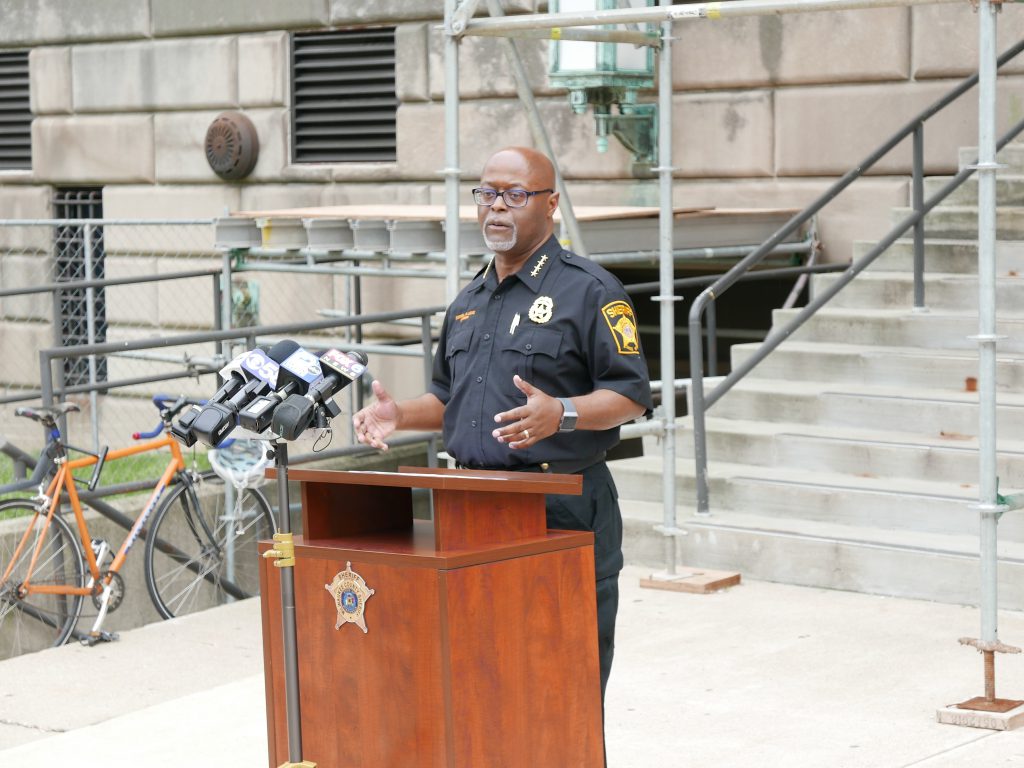Should Sheriff’s Budget Be Cut?
When it comes to defunding police, the county sheriffs are an obvious place to start.
Across the nation there has been a call to defund police agencies — cutting the budget and reallocating the money to pay for social services and improve underlying conditions that can lead to crime. Most of the attention locally has been on the Milwaukee Police Department. But there is a much more obvious target for defunding: the Milwaukee County Sheriff’s Office. The Sheriff’s Office had long been a sacred cow for county officials, particularly for former County Executive Scott Walker: the sheriff’s budget rose by 61 percent from 2001 to 2011, or about twice as fast as inflation, as I’ve previously reported. Most of that happened under Sheriff David Clarke, the tough talking conservative who managed his department’s finances like a wild-eyed liberal: the tax levy for his budget rose by 33.5 percent from 2007-2012, more than three times the rate of inflation.
To put that figure into more dramatic context, the county has been eliminating departments and cutting services going back to the 1990s, as it faced ever greater financial challenges, yet the Sheriff’s budget kept growing.
Walker was replaced by Chris Abele in 2011 and it was clear by then the county faced a growing structural deficit. To Abele the low-hanging fruit was the Sheriff’s Office.
After all, he argued, Milwaukee was the only full incorporated county in Wisconsin, with local police departments covering every inch of the county, so why were taxpayers paying ever more each year for the Sheriff and his many deputies, some 660, when Abele assumed office?
The Sheriff’s Office polices Mitchell International Airport, the county jail, courthouse and freeways within the county but does very little enforcement of crime. Abele brandished state statistics showing that in 2009 the sheriff reported only 19 crimes to the FBI, compared to 41,375 for the Milwaukee police, 3,288 for West Allis police, 1,908 for Wauwatosa and even 242 for the UW-Milwaukee police. That’s right, the UWM campus police handled 12 times more criminals than the Sheriff’s Department. In 2010, Urban Milwaukee reported, the number of arrests was nearly as low for the Sheriff’s Department.
Nowadays the data is less detailed, and includes only the four major violent crimes, but shows the Sheriffs Office made only 69 or 2.3 percent of the 2,899 arrests made in Milwaukee County in 2019. But Ted Chisholm, spokesperson for current Sheriff Earnell Lucas, says the total number of arrests made in 2019 was around 2,500, mostly from work by deputy sheriffs patrolling parks and freeways, and probably including many driving related offenses.
Abele tried repeatedly to cut the Sheriff’s budget, enduring constant abuse from Clarke, but had limited success because Clarke would simply overspend his budget. The difference between the adopted county budget and actual budget of real money spent looms large in past county data. But the most recent actual budget, for 2016, shows the Sheriff’s budget at $88.3 million and 771 employees, up from $83.7 million and 658 employees in 2012.
The “operating budget” for the Sheriff’s department has gone down considerably since then and based on that figure, County Supervisor Ryan Clancy is pushing for a 25 percent or $11.6 million cut in the Sheriff’s budget, as Urban Milwaukee’s Graham Kilmer has reported. A long list of activist groups in Milwaukee support the idea, including Black Leaders Organizing for Communities, Milwaukee Area Service and Hospitality Workers Organization, Black Educators Caucus, African-American Civic Engagement Roundtable, The Milwaukee Democratic Socialists of America and its Black Socialist Caucus.
Those figures suggest the current Sheriff’s budget is about $46.5 million, which is what the most recent adopted budget figure was, but is far short of the last actual budget. Meanwhile, Lucas submitted a proposed budget with just at a 1.4 percent reduction for his department. And according to Clancy, Lucas has since then submitted a revised budget that is really as increase of $10 million as it includes $10 million charged to other departments for services rendered by deputy sheriffs.
Chisholm says this is inaccurate and there have been few if any charge offs to other departments, and the budget is still at $46.5 million. But the budget submitted by Lucas includes 723 employees in 2020, down by only about 7 percent since 2016, when the actual budget was more than $88 million. Given that the Sheriff’s budget is driven by personnel costs, there is room to question whether the actual budget, as it has in past years, will exceed the submitted budget.
Milwaukee County Executive David Crowley has pushed the idea that all county budget decisions should be made through the lens of racial equity, which suggests he would be sympathetic to a plan to defund police. And Clancy believes he has wide support from his fellow county board members. But it seems clear they will face a fight with Sheriff Lucas. In an interview with WUWM’s Joy Powers, Lucas cautioned that the community should be careful about what police can “take off their plate,” while adding this challenge: ”How do you measure the absence of crime?”
But the idea that county sheriffs are about stopping crime is contradicted by statistics showing how little they have to do with this. In a fully incorporated, fully policed county like Milwaukee, taxpayers are already charged a ton for policing, including nearly $300 million for Milwaukee police and more than $100 million for police in 18 suburbs surrounding the city.
The county sheriff’s department has long needed down-sizing with an eye to cooperative deals with other police departments to save taxpayers money. But now that the county faces an expected post-pandemic financial shortfall of $45 million in its total budget, it will need all the budget cutting and creativity it can possibly muster. Indeed, the situation is so dire that it’s hard to imagine the county being able to reallocate any money to beef up social services, as defunding advocates hope to see. Simply repairing the massive shortfall facing the county will be a herculean undertaking, particularly if there are no cuts from the Sheriff’s Office.
If you think stories like this are important, become a member of Urban Milwaukee and help support real, independent journalism. Plus you get some cool added benefits.
Political Contributions Tracker
Displaying political contributions between people mentioned in this story. Learn more.
- June 30, 2016 - David Crowley received $1,000 from Chris Abele
MKE County
-
Ron Johnson Says Free-Market Principles Could Fix Education
 Jul 17th, 2024 by Graham Kilmer
Jul 17th, 2024 by Graham Kilmer
-
RNC Will Cause Some County Services To Be Moved to Wauwatosa
 Jul 12th, 2024 by Graham Kilmer
Jul 12th, 2024 by Graham Kilmer
-
Hank Aaron State Trail Will Be Closed For RNC, State Fair
 Jul 12th, 2024 by Graham Kilmer
Jul 12th, 2024 by Graham Kilmer























Why does the Sheriff patrol the freeways? Doesn’t the State handle that job for every other county? If so, why shouldn’t they do that for Milwaukee County, too?
Why do Sheriff’s deputies handle the security entry to the courthouse? I’m sure the county could save money by hiring people to do this just like the airport.
TransitRider, The state pays the county to patrol the county freeways. Not sure when or exactly why that process started or how much the reimbursement is. I moved here in 1978 and it was already in place then.